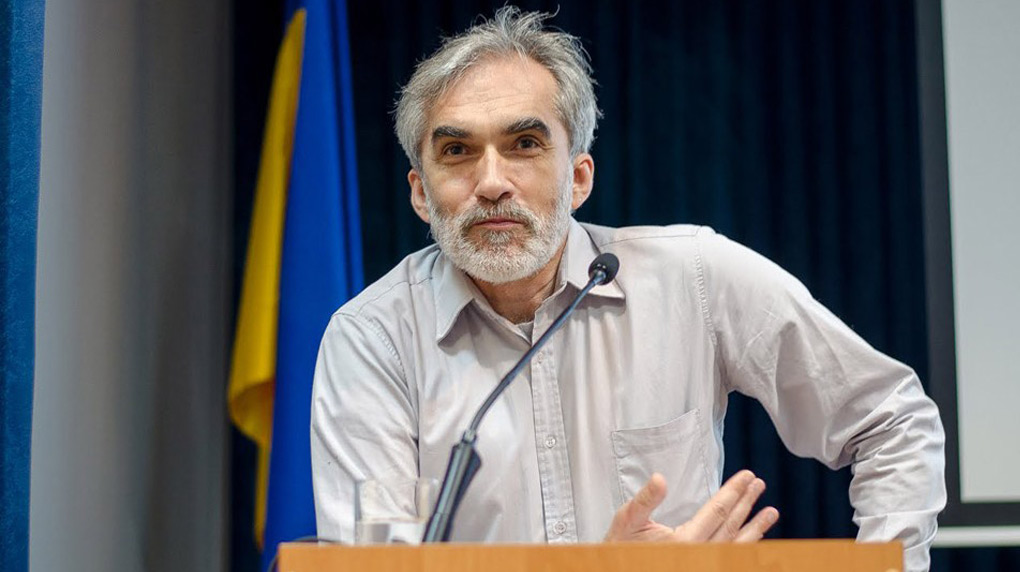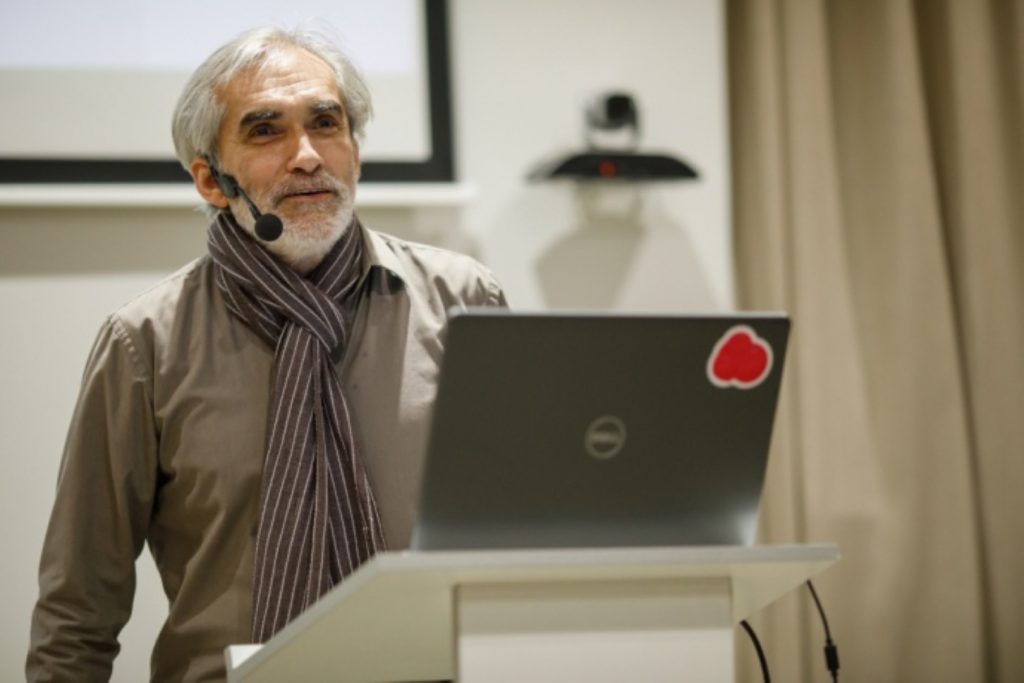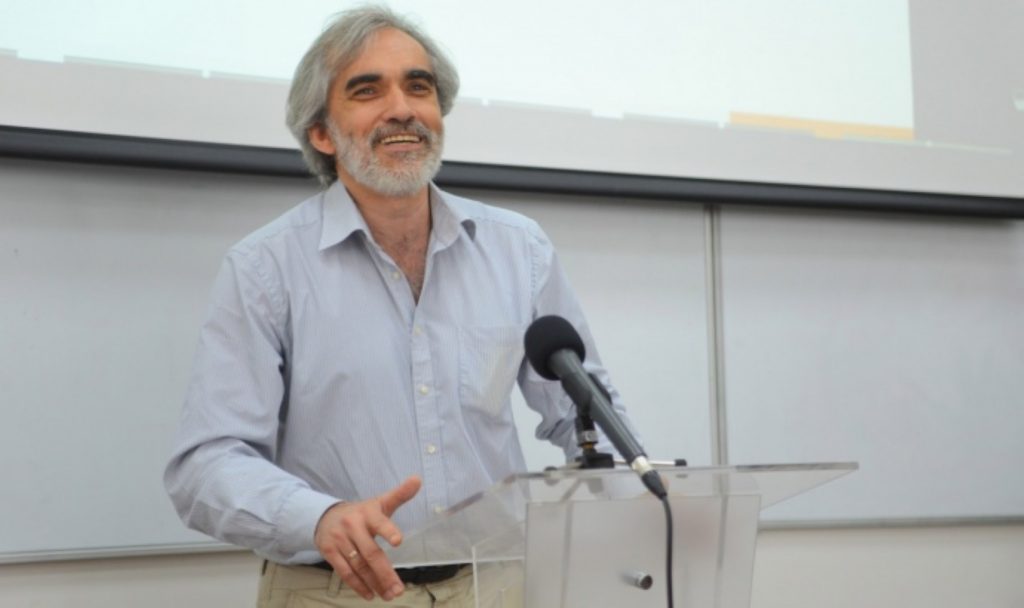Yaroslav Hrytsak: Ukraine will become a new Central European tiger
Originally published in Ukrainian @pravda.com.ua
Sunday, 1 March 2022
"I would like to live in a boring country," said Yaroslav Hrytsak, one of Ukraine's best-known historians, to conclude the first part of the conversation.
This interview was initially planned to be published toward the anniversary of Crimean resistance on February 26, but it never happened, for obvious reasons.
We met Prof. Hrytsak for the second time in Lviv after everything we saw in Bucha and Borodianka and after the news from Mariupol, which is blocked by the Russians and continues to resist.
In this conversation, he reflects on what the current war will be called in future school curricula, how to cure Russia, and what mistakes Europe has made.
Prof. Hrytsak, we recorded part of this interview when the situation in the country was tense in anticipation of a full-scale war. Today, the war has been going on for more than two months. What is this war about now?
It is a war for the future of the world, period. That's my shortest answer, which I can expand further.
Please do.
First of all, this war is about the future model of the world. The modern world has the Western model: we use smartphones, wear jeans, vote for parties vying for seats in parliament, serve the motherland, and swear allegiance to the nation.
All these things, phenomena, and concepts are Western products. The West has become global and has spearheaded globalization. The fall of communism in 1991 was the culmination of its victory.
However, it so happens in history that the pinnacle is the beginning of an end. Francis Fukuyama foretold the end of history. Now the end of the West is being discussed by new countries that want to determine the future, and this future may no longer be Western.
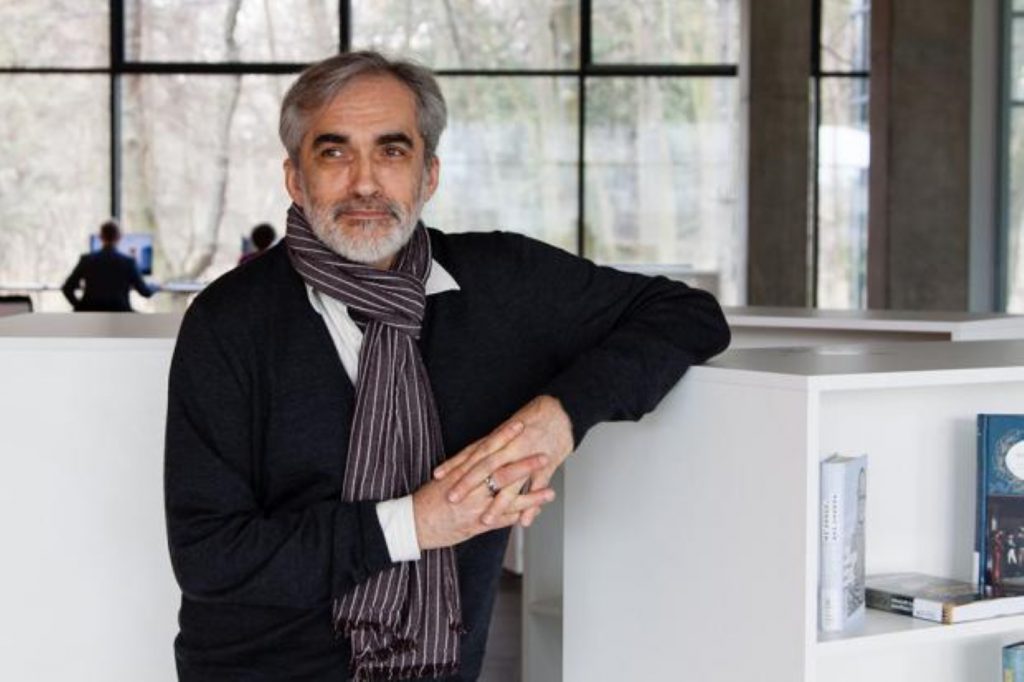
Which countries will determine the future?
BRICS countries: Brazil, Russia, India, China, and South Africa. Unlike the West, they have had high growth rates. They are very different. But the two largest, Russia and China, are not democracies. They offer an authoritarian model of modernization, an alternative to the West with a free market but no political freedom.
This model enjoys support from citizens because it allows them to improve their lives, even though it is hard to call them citizens. These are subjects without political rights rather than citizens.
This model looks attractive to many countries but not for Ukraine. Although many people in Ukraine were willing to sacrifice freedom for the sake of prosperity, the pro-Western orientation eventually prevailed.
This victory came at a high price: deaths on the Maidan, the loss of the Crimea, and warfare in the Donbas. And since February 24, the price has become immeasurably higher.
Yes, Russia is punishing Ukraine for its Western choice. At the same time, this war is deciding the fate of the future model of the world.
Note that almost no one is talking about BRICS now — it has run out of gas. Only China and Russia remain. It seems that the West will remain the only model provided, of course, that it gets its second wind.
What can save the West today?
A crisis can save the West.
But a crisis already hit a long time ago.
Strange as it may sound, I wished for the West to encounter a crisis. A crisis is the only thing that can shake it up and awaken it.
The history of Europe is a continuous crisis. One crisis after another, which is just like the history of Russia or China, after all. But unlike Russia or China, each European crisis ends in a solution that sets a new direction in the world.
This crisis is different in that Ukraine has finally become part of its solution. Ukraine used to be factored out — it belonged to the Russian sphere, and the West couldn't or didn't want to deal with it. Now the situation is entirely different.
Do you see that self-preservation has been triggered and that the West is really ready to fight for itself?
It has been activated, but not entirely. The West does not yet fully comprehend the threat. We, Ukrainians, have this feeling of being threatened.
The West doesn't have it yet but has woken up because the main elements of its faith have fallen.
Which ones?
The central element is that war in Europe is no longer possible.
Let me remind you that WWI and WWII originated on the European continent and from European conflicts. All of post-war Europe was built so that it would not happen again.
We may have many just grudges against the European Union. Still, there is one area where the EU works very reliably: it is impossible to imagine a war between two neighboring states in a united Europe, while they used to fight almost continuously.
Europe felt that this was a thing of the past. This feeling grew into a firm belief after the fall of communism and the end of the Cold War. All borders became inviolable; former enemies were reconciled with each other; visa-free travel was introduced; good life and comfort — why wage wars?
The first wake-up call was the Yugoslav war. But it was, so to speak, a weak wake-up call, because Europe looked at the Balkans as a kind of exotic area that was part of Europe but also not really part of it at the same time.
Instead, Ukraine is a complete entity. Geopolitically, it is more important than the Balkans. The fate of WWI and WWII largely depended on what happened in and around Ukraine, including, perhaps most importantly, what happened to our peoples — Ukrainians and Crimean Tatars. And we paid a very high price. Those who had control over Ukraine had a better chance of winning the war.
It was a war for Ukraine, but Ukrainians did not have their voice in it. All our attempts to obtain this voice in the national liberation struggle failed. We were a subject rather an agent. And now it's different: we are an agent. Moreover, thanks to our Armed Forces, Ukraine's agency is now reaching the sky.
Another wake-up call is, obviously, Bucha. It is extremely powerful not only for us but also for the world at large.
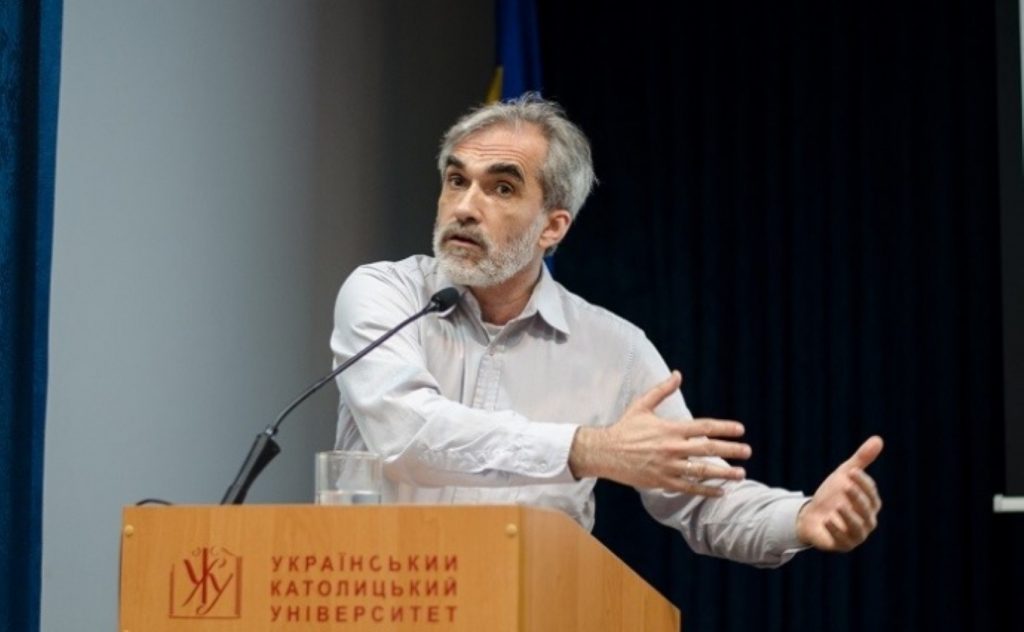
What makes it powerful for the world?
Because this is genocide. No one could have imagined it in the 21st century. Srebrenica in 1995 was thought to have been the last act of genocide in Europe.
If a new genocide could happen, it would be somewhere in Asia or Africa. But it has occurred very near, a few hundred kilometers away from Warsaw or Berlin — almost inside Europe.
Can we say that the fear of war has brought Europe to a situation where this war has happened?
To some extent, yes. But only to a certain extent, because it was not only the fear of war but also disbelief in the possibility of a war.
It was disbelief that Putin would go to war and belief that he was not suicidal and had not lost all reason.
Speaking about Putin, the world has been feeding this beast since 2014, when he occupied Crimea. And this war, which Europe did not want to consider its own, began after the Crimea.
I agree partly. Putin's plans for Ukraine were developed long before 2014, back in 2008, immediately after his war with Georgia. The West behaved shamefully back then, essentially persuading Georgia to surrender. For Putin, this was a signal that the West was weak and unable to resist.
In 2014, Putin believed that if he launched an attack on Ukraine, the Georgian scenario would be repeated. And that since the West was divided and in disagreement, he would negotiate separately with Paris, Berlin, and Rome, following the divide-and-conquer principle.
But Merkel said: no, you will not negotiate with me separately — there is Brussels, and all talks should go through Brussels.
This was the first indicator that Europe woke up. A weak indicator, but still. The West did not accept the occupation of the Donbas and the Crimea, just like that of Abkhazia and Ossetia earlier, and imposed sanctions on the Kremlin. Of course, these sanctions were weak, almost cosmetic. But they were important as a signal to Putin.
It is important to emphasize one more thing: in the case of 2014, this was one of the first times that Brussels and Washington took the same stance. Brussels and Washington, as we know, generally do not like each other and occasionally lead a cat-and-dog life together.
All this was to show Putin that the West was not what he imagined it to be. After the failure of the Russian spring in Ukraine, there was hope that Putin would learn the lesson and comprehend a thing or two. Now we see that this hope was naïve.
But now Russia is left alone.
Russia is left alone when it comes to first-world countries. But it has more or less open allies among third- or even second-world countries, such as Hungary, which is infected with anti-Westernism.
In any case, most politicians who are now in power in Europe and North America cannot wrap their heads around the level of Putin's madness. It seems that when it comes to Ukraine, Putin simply goes berserk.
But Putin is not the only one who takes this position. It is embraced by the majority of Russia's elite. I would like to draw attention to one characteristic point. Putin came out of the KGB but entered Russian politics through the Russian opposition rather than the KGB. He was a creature of Sobchak and Yeltsin, two leading opponents of Gorbachev's perestroika.
Alexander Tsypko, a former adviser to Gorbachev, said that when Yeltsin and his entourage discussed what to do with Ukraine in 1991, they decided to let Ukraine go. They believed that Ukraine was unviable as a state and therefore would sooner or later return, but already on its knees, and then Russia would dictate new, tougher conditions.
Time passed, but Ukraine never returned, neither on its knees nor on its feet.
When Putin succeeded Yeltsin, he developed a fear that Russia could lose Ukraine once and for all. He was particularly afraid that a new generation would grow up in Ukraine with no memory of the Soviet Union or a special attachment to Russia. It would come to power after a few years, and then it would be too late to do anything with Ukraine.
Putin took the first Maidan in 2004 very seriously, perceiving it as a personal threat.
Putin is authoritarian, and, like any autocratic ruler, he thinks that there is no society and public opinion independent of the government. Everything that is called independent is either manipulated or bought.
Accordingly, Putin saw the Maidan as a Western manipulation directed against his government: since Ukraine was geographically and historically connected to Russia, what happened in Ukraine could also occur in Russia.
The Russian–Ukrainian conflict is somewhat similar to the conflict between Arabs and Jews. Both nations believe that Palestine and Jerusalem are essential to their identity. Similarly, Ukraine and Kyiv are essential for both Ukrainians and Russians.
Therefore, it inevitably takes on the character of existential confrontation. This is an either-or, rather than and-and, question.
If Ukraine moves toward the West, this is an existential threat to Russia.
But Putin did not expect this kind of resistance from all of Ukraine.
No, he didn't. And the West did not expect it, either, but in a different way. It did not expect strong opposition from the Ukrainian government and the Ukrainian army.
From what I know, Americans repeatedly warned us of the danger on the eve of the war, but the government in Kyiv either ignored or pretended to ignore these warnings. Therefore, Washington believed that little could be expected from neophytes in power and that Ukraine would be captured in a few days, and then a guerrilla movement would begin in Ukraine.
NATO's or America's strategy was to actively support the guerrillas to eventually defeat Putin. Americans know from their own experience that even the best-organized and best-equipped regular army cannot withstand guerrilla resistance and will have to retreat sooner or later.
How would you describe Ukraine in its resistance today? What is it? Is there an image that comes to mind?
Obviously, the Cossacks, Shevchenko, Kruty, the UPA, and even Ukrainians in the Red Army.
So, can we say that this war has become a catalyst for the entire history of Ukraine?
More precisely, for different histories. Ukraine does not follow the either-or model. It is like Noah's ark that has every kind of animal.
Ukrainian society is horizontal. This is exactly how it is fighting. I recently heard a discussion between two good Western military experts. They discussed what would have happened if Zelensky, God forbid, had died in the early days of the war at the hands of Russian subversive groups.
They concluded that it would have been a great tragedy, but it would not have deprived Ukrainians of a chance to emerge victorious. This is because each mayor acts like a little president, making his own decisions without waiting for orders from above.
The Ukrainian army differs from the Russian one in its initiative and flexibility. In Russia, the decisions of a junior officer at the front line depend on the general's will. This fact, among other things, explains such a relatively high number of dead Russian generals. They have to go to the front line to solve problems.
Last but not least, an existential threat creates a feeling of strong solidarity and love. This may sound strange and pathetic, but Ukraine is now a country of love. We have never loved ourselves and our homeland so much.
We hate Russians. But we have a sense of solidarity, sympathy, love, and pride for this extremely beautiful country. We feel the fullness of existence. Russia cannot have that.
Returning to the statement that this war is, in fact, a civilizational denouement. What outcome of this war do you see for Ukraine?
I believe that Ukraine will become a new Central European tiger. It will become a leader in the large region between the Baltic Sea and the Black Sea. I think that no country, with the possible exception of Poland, will be able to match Ukraine's influence and status.
This will [not] happen automatically with the victory. Instead, it must result from significant purposeful efforts after the victory.
War is a great catastrophe. But at the same time, it creates great opportunities and turns the previously impossible into possible.
As far as Russia is concerned, it does not have a good scenario. Russia has a choice between a bad scenario and an even worse one.
In your opinion, what would be a bad and a horrible scenario for Russia?
A bad scenario for Russia is a slow decline. It's like the last years or maybe even months of the Soviet Union, like the Brezhnev-Andropov stagnation.
Then, for the sake of their salvation, a group of the ruling elite will hand over power to themselves and try to reform Russia again. But the road to normalization will be long, perhaps very long, after the devastation left by Putin, the war, and the sanctions.
A horrible scenario is for Russia to become a war zone where everyone is against everyone. The central government disappears. There will be several different authorities and civil war. In short, this is a choice between the scenarios of 1919 and 1991.
If this choice concerned only Russia, that wouldn't be too bad. But events in Russia will inevitably affect its neighbors, including Ukrainians. It is too dangerous to be in the vicinity of an active volcano.
Russia itself does not have a good scenario. However, a positive scenario can be created from the outside, like it was done in post-war Germany.
Germany was denazified, while Russia must be derussified. Derussification here means that Russia would cease to be a great "Rus'" state, forget the notion of the "Russian world" and itself as a separate civilization, and finally become a normal country.
Russia will have to be demilitarized, and control over the nuclear button be resolved. Sanctions can only be lifted in exchange for certain steps on the part of Russia.
This is blackmail, but it's normal because we are talking about disarming an aggressor.
There is a worldwide movement to boycott Russian culture these days. How fair is this phenomenon?
It's unfair — it is unlikely that Chekhov is somehow guilty before us — but it's the right thing to do.
Nevzorov said it best. Culture is something that is supposed to bring people out of barbarism. Rather than do that to Russians, Russian culture, on the contrary, plunged them into a state of barbarism. Hence, it deserves a boycott to prevent it from affecting other nations this way.
I don't believe in collective responsibility in the legal sense, but everyone should be morally responsible in this case. Note the following paradox: I receive apologies from those Russians who, in my perception, do not need to apologize to me. They have always been anti-Putin, but they are ashamed of being Russian.
I want this sense of guilt to be cultivated not just in them but in all Russians. In fact, those who are guilty will never ask to be forgiven. This is the message of Russian culture — that Russia has always been right, because Russians are a separate civilization, and they have the right to behave differently from the rest of the world.
What follows the "great Russian culture" is the great Russian boot, and we all know that. By the way, I may be missing something, but have you ever heard the term "great British culture" or "great French culture"? No one uses the word "great." Why should only Russian culture be "great"?
The "great Russian culture" is in various ways connected with the idea of "great Rus," i.e., Russia that, like a shark in a pond, is too big to fit within its borders.
I have another question about collective responsibility, which is now being often discussed in Europe to push us, Ukrainians, toward dialogue with "good Russians." Are there "good Russians" in our current paradigm? Is this kind of dialogue possible and necessary today?
Good Russians exist, and I know them. There are good Russians among my friends. The only problem is that most of them have been abroad for a long time. They are non-existent in Russia. And they have never concealed their negative attitude toward Putin and their positive attitude toward Ukraine. The situation has been obvious to them.
Is dialogue possible now? It doesn't make sense, because it won't, in my opinion, replace the need for structural reforms, and the first structural reform is victory over Russia.
I rely on the example of France and Germany, which moved from war to reconciliation. They successfully went through this, but the initial condition for reconciliation was that Hitler had to be defeated, Nazism disarmed, and all those guilty punished accordingly.
Therefore, I believe that the precondition to reconciliation is victory over Putin and taking Putin out of the equation. And we see that the problem is not with Putin. The problem is the collective Putin. What's worse, it's not just a collective Putin but a Putin that keeps coming back.
Therefore, as a historian, I have this great fear that a new Putin will emerge even after 20–30 years of further reforms in Russia. Konstantin Eggert said it very well about Russian society: "Okay, now I have a car. But where is my empire?"
In other words, if economic growth in Russia resumes, won't there be a desire, a temptation to create another neo-empire?
Yes, because Russia has made the past an element of its identity.
A friend of mine has compared modern Russia to an SUV driving on impassable Russian roads with its entire windshield covered with dirt. And you don't see what's in front. The only thing you see is the side mirror that gives you a picture of what is behind you. You are actually driving forward, while looking back.
Russia is not overcoming the past; Russia is sinking deeper and deeper into it, like in a swamp. In other words, Russia is an example of how too much history can do harm. When memory becomes not a direction for the future but toxic material that pulls you back into the past.
I keep saying that a chemical reagent can be used for both narcotics and medicines — the key thing is proportions. Russia is infected and toxic. The only recipe for its treatment is defeat and collapse.
This brings us to the next question. Ukraine is the crucible of the Bloodlands: The Holodomor, the largest number of WWII victims, then the largest nuclear disaster in human history, and now this brutal war with genocide in the 21st century. Why so? Why does Ukraine have to pay such a high price?
The closest parallel that comes to mind is Palestine. A small area cannot be equated with Ukraine, of course, but the local conflict that is taking place there is of global importance.
What is now happening in Ukraine, viewed from a broader perspective, calls into question the world's future.
In a manner of speaking, Ukraine is the Palestine of the 21st century. This seemingly local conflict has a decisive influence on world politics.
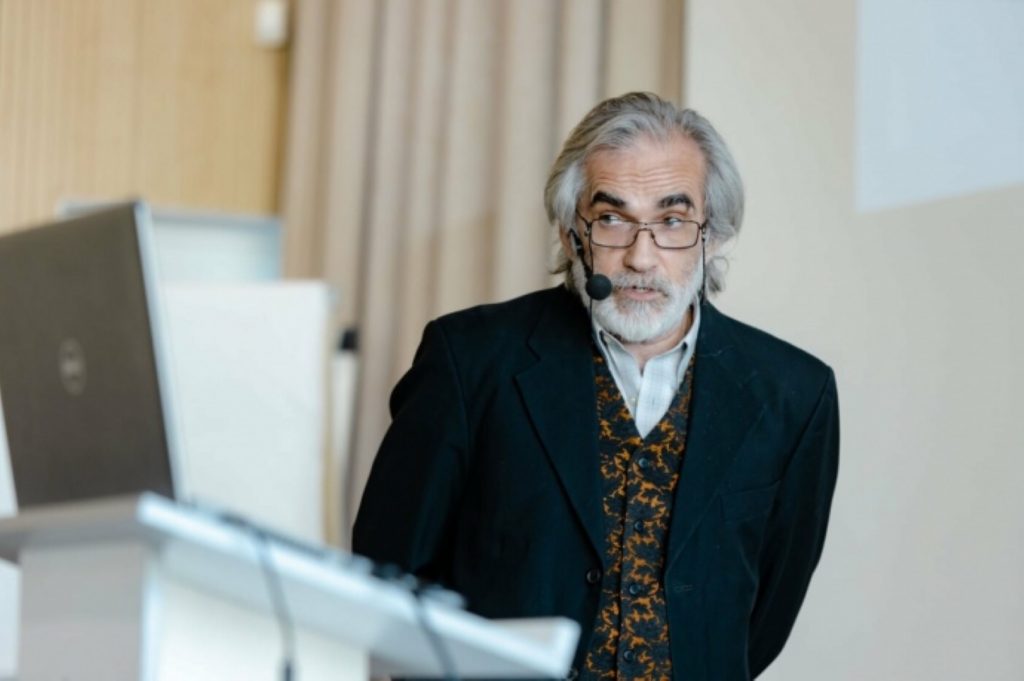
Hybrid warfare is also about manipulating narratives and spreading deliberate lies. Before the full-scale invasion, Putin decided in his address to re-interpret the history of Ukraine and noted that "modern Ukraine was entirely created by Russia, more precisely by the Bolshevik, communist Russia."
What task are Ukrainian historians facing today in terms of creating their own agent-based view of Ukraine's history both inside the country and abroad?
The main task is to pull Ukrainian history out of the Russian shadow. On the one hand, it has to be shown that Ukraine's past has many more contexts than the Russian one.
The list of these contexts is long: ancient (both Greek and Roman); medieval Europe (75% of all marriages of the children of Kyivan princes were with Western Catholic monarchs); Renaissance Europe; the Polish-Lithuanian Commonwealth with its practice of limiting the central government; the Reformation; Jewish culture (Jews were virtually unknown in the Russian Empire until 1772); the Holy Roman Empire (remember that, until 1807, this was the official name of the Habsburg Monarchy, which ruled over Galicia, Bukovina, and Transcarpathia at the time); the Muslim context (the Cossacks not only fought against the Turks and Crimean Tatars but also formed alliances with them).
Against the background of all these contexts, the Russian context looks like one among many and not even the main one. And Putin's attempts to monopolize Ukraine's history appear ridiculous, to say the least.
On the other hand, it has to be shown that Ukraine's past is larger than Ukraine itself. Much of what happened in and around Ukraine decided the fate of Russia, Central and Eastern Europe, sometimes entire Europe, and even the world.
After all, we are seeing it now. Thus, it is impossible to leave Ukraine alone in trouble, as this will have hugely negative repercussions for the whole world.
You have also mentioned the Crimean Tatar context. To what extent have the Crimean Tatars become accepted by Ukrainians as their own people?
I assume that this happened as late as after the temporary occupation of the Crimea, unfortunately. That is to say, we knew that Crimean Tatars were part of our people, but we knew it theoretically until this common misfortune happened to both of us.
Then suddenly we felt that we were very much one people. I am ashamed to admit that Crimean Tatars continue to be depicted in school textbooks as butchers of the Ukrainian people.
Please don't take this as a reproach: your latest work Overcoming the Past. A Global History of Ukraine thoroughly systematizes various aspects of Ukrainian history, including from a global perspective, but mentions Crimean Tatars only in passing as a kind of external factor. I don't see the inclusion of the Crimean historical context into Ukrainian history. Why so?
I am ashamed to admit that I know very little about the history of the Crimean Tatars. I would like to learn more.
But it's not just my personal fault. It's also your fault. There are very few works on the history of the Crimean Tatars. As long as you stay away from writing your own history, others will be doing it for you.
I have this standing request for you, and I repeat it all the time: educate your young historians who will write about you through your own perspective but in a broader context.
We had the same problem in Ukraine 30 years ago when we simply did not have a generation of young historians. This must be done.
Returning to my situation, I have decided that in the second, revised and expanded edition of my book, I will include a separate section with a brief history of the Crimean Tatars.
Almost until the end of the 19th century, Poles, Crimean Tatars, and Jews — but not Russians — were the main enemies in Ukrainians' imagination and people's memory.
In the 20th century, a reconfiguration took place: Poles, Jews, and Crimean Tatars ceased to be enemies of Ukrainians and became their allies or even part of the Ukrainian nation in a broader sense.
This was due to strong historical ties and obvious historical parallels between Ukrainians and Crimeans. Our paths are very similar.
Ukrainians were not born Ukrainian; they became Ukrainian. The same goes for the Crimean Tatars. These two peoples have become what they are as a result of conscious national choice. Both Ukrainians and Crimean Tatars had several options as to who they could become.
For example?
In the 19th century, Ukrainians debated who they could be. There was an option, particularly in Galicia, that Ukrainians were, in fact, Poles — that they were Poles of Ukrainian origin. We have many examples from among the Polish nobility, such as Andrei Sheptytsky and Viacheslav Lypynsky, who returned to Ukrainian identity.
Many people thought that Ukrainians were part of the Russian people who lived "from Kamchatka to the Carpathians." Others believed that there was, in fact, another nation that we do not mention now, the so-called Ruthenian nation composed of Ukrainians and Belarusians ("Ruthenians") of the former Polish-Lithuanian Commonwealth.
Even before the 19th century, textbooks of the Ruthenian language were published, presenting it as a common language of Ukrainians and Belarusians. There was also a local Ruthenian option in Transcarpathia, as some Ruthenians on one side of the Carpathians did not accept Ruthenians from on the other side, considering themselves a separate nation.
Moreover, there was a possibility of having two separate nations similar to the Serbo-Croatian scenario: a Greek Catholic Ruthenian nation in Galicia and Little Russians of the Orthodox faith in the Russian Empire. There was also the last option, which was to have one big Ukrainian nation that would unite all these groups. And this option won.
This is something that modern readers find hard to believe. They think it has always been the way it is now and that Ukrainians have existed at least since Kyivan Rus'.
Historians know about heated identity debates that raged even in the 19th century. The main disputes took place in Austrian Galicia, which, in contrast to the Russian-ruled part of Ukraine, had freedom of discussion.
However, choosing a Ukrainian identity was not easy. Suffice it to say that Markiian Shashkevych was the only Ruthenian Triad member who preserved his Ukrainian identity. Ivan Vahylevych became a "Pole of Russian descent," while Yakiv Holovatsky turned into a Muscophile. In my biography of Ivan Franko, I show when and how he decided to be Ukrainian. In his youth, Franko had Muscophile tendencies but was considered a "Polish-Ukrainian poet" in his later years.
There is someone who was the first to identify themselves as Ukrainian in every Ukrainian family. I know that my great-grandfather was this person in my family. I suppose that many Ukrainians, especially in southern and eastern Ukraine, made this choice only a generation ago or are making it now to the sounds of exploding Russian shells.
The Crimean Tatars, or the Crimeans, also faced several options. One was to become just part of the Turkic world, a great Turkic nation, along with the current Turks, Azerbaijanis, and the Tatar world.
The second option was to turn into a separate Tatar nation composed of Volga and Crimean Tatars. Finally, there was the option of becoming a separate nation, just the Crimeans, and that's the one you have chosen. It was a conscious choice.
What makes the histories of Ukrainians and Crimean Tatars similar? The fact that their choices are fundamentally European.
Ukrainian identity emerged under the strong influence of Western ideas: self-government, limited central government, and nationalism and socialism in modern times.
We are very different from Russians because we have other cultural and political traditions.
The choice of the Crimean Tatars is also fundamentally European as they have absorbed urban and European culture, from local Greek and Byzantine colonies to Italian and German trading posts.
In a manner of speaking, Ukrainians are the biggest Western choice of the Orthodox world, while the Crimean Tatars are the biggest Western choice of the Muslim world.
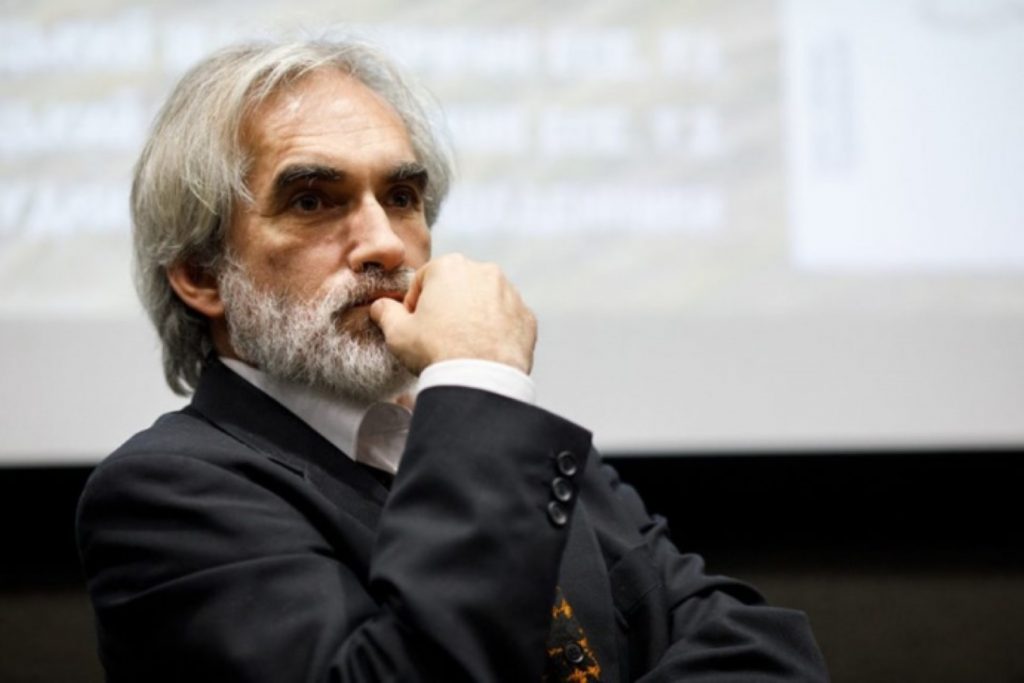
Prof. Hrytsak, the following question is occasionally debated in the public sphere: "Why do Ukrainians need Crimean Tatars?" Let me ask you a somewhat provocative question by turning it around: Why do Crimean Tatars need Ukraine? Today, the vast majority of Crimean Tatars live on the peninsula, and the realities have been entirely different in the occupied territories than in Kyiv or Lviv over the past eight years.
The people who remained on the peninsula have lived in a survival paradigm. Ukraine offers a much richer array of options than just survival, which is very important.
That is why Ukraine is about freedom, fulfillment, and other prospects. The notional advantage of Russian life is stability, but this stability is of the cemetery variety.
Here is the simple thing that was obvious to Ukrainians in the 1990s: if you are part of the Russian Federation, be prepared that your children will fight in Syria, Ukraine, Ossetia, or even in Alaska, wherever they are sent. In other words, you may be temporarily getting some goods or temporary stability, but you are not buying security. You and your children will always be in danger.
What should Ukraine focus on after the war, apart from rebuilding the country?
Ukraine has one big unfulfilled job to do, which is creating a system of independent and fair courts. This is the key reform that must be completed, as no economic success can be achieved without it.
And this is part of the broader process of modernization. This is when we leave the world of poverty and lawlessness and enter the world of wealth and freedom. It is a continuous, endless process. It's like riding a bike: you have to pedal all the time because if you stop doing that, you will fall.
What will this war be called in history textbooks after a while?
It depends on how it ends. It's not over yet, and I'm afraid it will continue for a long time. It may become the Third World War and will be called that. But this is the worst option.
If this doesn't happen, it will, obviously, have a technical name, the Russian–Ukrainian war.
I believe that this is the Ukrainian Patriotic War. It is the first patriotic war because all our wars were fought either by separate groups or by distinct regions, while here we see nationwide resistance.
But I also say that this is a war for the world's future.
We are talking about creating a new security system. It is not just a reform of Europe. The world is global. We are facing enormous global problems: overpopulation, lack of resources, and warming. But now, there is another global challenge called the "Russian problem." No other problem is currently a bigger threat to the world than Russia.
The Russian problem is global, but Ukraine has, fortunately, also become global by now. There won't be two separate solutions, one Ukrainian and one global. On the contrary, the Ukrainian outcome will be part of the global solution. Crucially, Ukraine is already involved in it.
Sevgil Musayeva and Alim Aliev
Translated from the Ukrainian by Vasyl Starko
NOTE: UJE does not necessarily endorse opinions expressed in articles and other materials published on its website and social media pages. Such materials are posted to promote discussion related to Ukrainian-Jewish interactions and relations. The website and social media pages will be places of information that reflect varied viewpoints.







